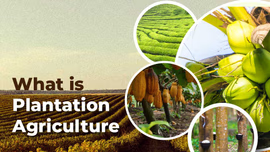Agritourism: Enhancing Livelihoods of Indian Farmers

Table of Contents
- Introduction to Agro Tourism
- What is Agritourism?
- How Agro Tourism Can Benefit Indian Farmers?
- Scope of Agro Tourism in India
- Agro Tourism Projects in India
- Government Initiatives to Promote Agro Tourism
Introduction to Agro Tourism
Agrotourism is a new concept in the tourism industry that can improve the livelihoods of farmers in India. The idea emerged in Italy in the 1970s and 1980s, but in India, it started in 2004 with the establishment of the Agri Tourism Development Corporation (ATDC) in Baramati, Maharashtra. Shree Pandurang Taware is considered as the father of agritourism in India.
What is Agritourism?
Agritourism is the combination of the words 'Agriculture' and 'Tourism'. It means promoting farms as tourist destinations by attracting tourists to farmlands. It is a lucrative agribusiness model for farmers that combines working agriculture operations with commercial tourism.
Other names of agro tourism are agricultural tourism, farm tourism, and agritainment. It complements rural tourism in India because agritourism enables tourists to enjoy real-life experiences of rural life.
The main activities of agritourism are farm visits, farm stays, recreational activities like bullock cart rides ,fishing, farm education and direct selling of agricultural produce to consumers.
The following three things should be kept in mind to make the most of agro tourism:
- Tourists should be able to see something.
- Tourists should be able to do something.
- Tourists should be able to buy something.
These three things are also called basic principles of agro tourism.
How Agro Tourism Can Benefit Indian Farmers?
The emergence of agricultural tourism in the Indian landscape has been a boon for farmers. Several benefits of agro tourism to Indian farmers are:
Overcome the Profitability Issue in Agriculture
Indian agriculture is prone to price volatility, and farmers do not get reasonable prices for their agricultural produce. Thus, there is always a downside risk to profits. Agro tourism widens the area of farm operations and reduces the risk of crop failure and, hence, losses.
Extra Income to Farmers
Agro tourism is a low-cost, high-return agricultural activity. It provides extra income to farmers by allowing them to sell their local products, such as handicrafts and potteries, directly to tourists.
Providing Opportunity to Youth to Become Agripreneurship
The young generation is less motivated to engage in traditional farming. Agricultural tourism can motivate young farmers to become agripreneurs by promoting farm tourism as an agribusiness. It can also halt the migration of youth to urban areas.
Providing Sustainable Rural Livelihoods
Agrotourism will help provide sustainable rural livelihoods by providing an opportunity to earn greater profits and good returns in the long run. Further, rural folks will no longer be job seekers; rather, they will be job creators.
Scope of Agro Tourism in India
Agritourism is a relatively new concept in India, but it is growing at a rate of 20% annually. In some states, like Maharashtra, Bihar, Sikkim, and Rajasthan, agrotourism is growing at a faster pace.
More than 70% of the Indian population is directly or indirectly dependent upon agriculture, and the total agricultural land in India amounts to 1.78 million square kilometres.
Agritourism, an eco-friendly tourism type, complements natural and rural tourism. An increasing number of urban people are demanding these types of tourism to spend leisure time.
Agro tourism is low-cost tourism, which enables it to broaden the reach of tourism to the wider population.
India has a diverse culture, geography, and agroclimatic conditions, which provide ample and unlimited scope for the growth of the agritourism business.
Farm recreation is one of the major activities under agrotourism. It is highly demanded by all age groups due to its potential to provide wholesome entertainment in the form of rural games, festivals, food, etc.
Agro Tourism Projects in India
Starting with Agri Tourism Development Corporation (ATDC) in Maharashtra, today, many prominent agrotourism projects in India are spread across Kerala, Madhya Pradesh, Goa, etc. Given below is the list of shining examples of agro tourism in India:
- Dudsagar Farm Stay and Plantation, Goa
- Vanilla County, Kottayam, Kerala
- Maachli, Sindhudurg, Maharashtra
- The Goat Village, Uttarakhand
- Tathagata Farm, Darjeeling, West Bengal
- Prakriti Farms, Rupnagar, Punjab
Government Initiatives to Promote Agro Tourism
Agrotourism is a critical component of rural tourism with a huge potential to check the 'rural decline' in India. Thus, various state governments and the Indian government have taken initiatives individually and as part of tourism schemes in India to promote agrotourism. These are:
- National Strategy and Roadmap for Development of Rural Tourism in India, 2022 aims to prioritise rural tourism at the national level by establishing model organic agro-tourism clusters.
- Identification of rural circuits as one of the thematic circuits under the Swadesh Darshan Scheme, 2015.
- Rajasthan Rural Tourism Scheme, 2022, to promote rural tourism in the state by setting up rural tourism units such as guest houses, agro-tourism units, etc.
- Agro Tourism Villa Scheme of Meghalaya to enhance tourist experience by offering funding for projects up to INR 1.5 crore.
Frequently Asked Questions On Agritourism: Enhancing Livelihoods of Indian Farmers
1. What are the activities of agro tourism?
Agrotourism activities include visiting farms, staying at farms, purchasing fresh vegetables and fruits, recreation, and education.
2. What are the benefits of agro tourism?
Additional income to farmers and providing sustainable livelihoods to farmers are some of the benefits of agro tourism.
3. Who is the father of agritourism?
The father of agritourism is Shri. Pandurang Taware.
4. Which state is the most developed in agri tourism?
Maharashtra is the leading state in agri tourism.
5. How agro tourism can help Indian agriculture?
Agrotourism will promote better use of farm lands, increase agriculture's contribution to the Indian economy, and thus increase farmers' incomes.


Related Blogs












